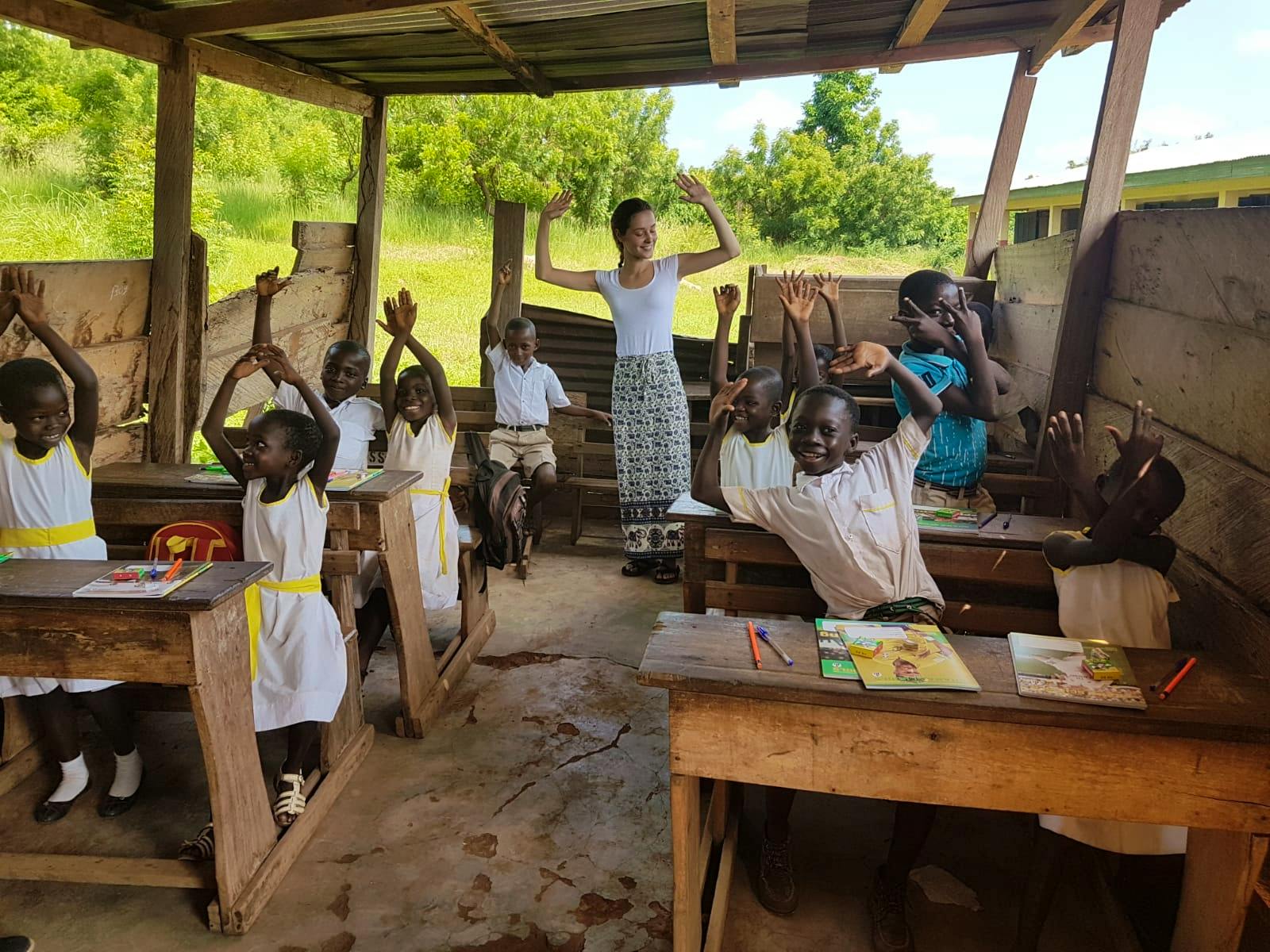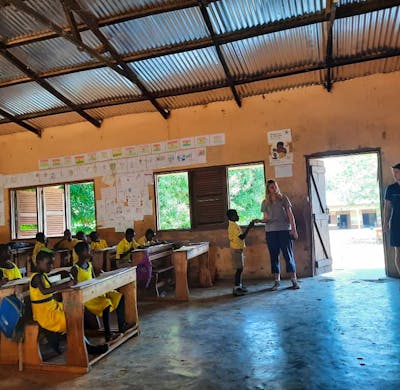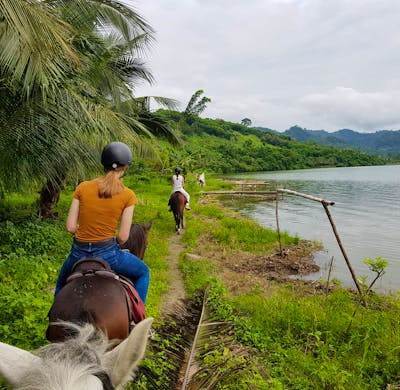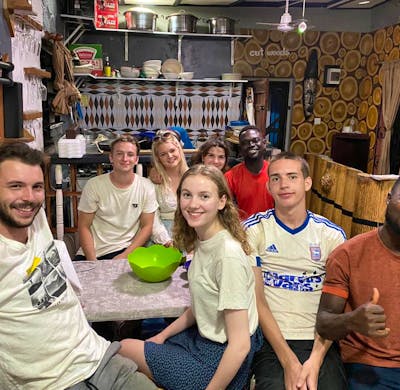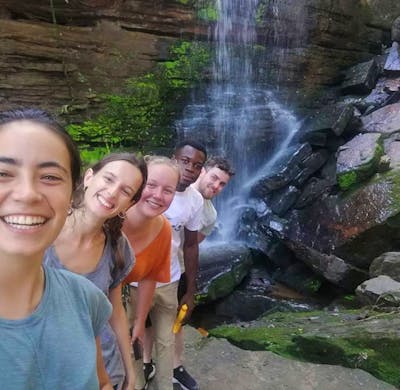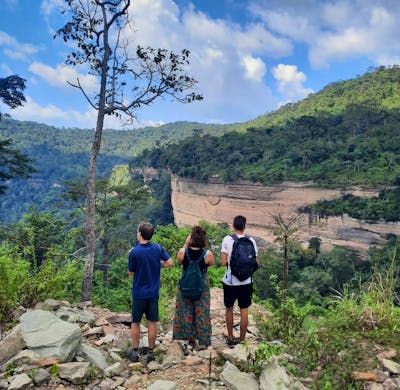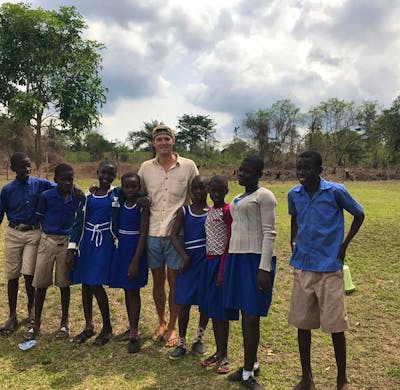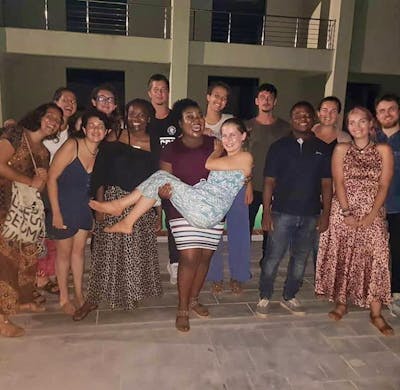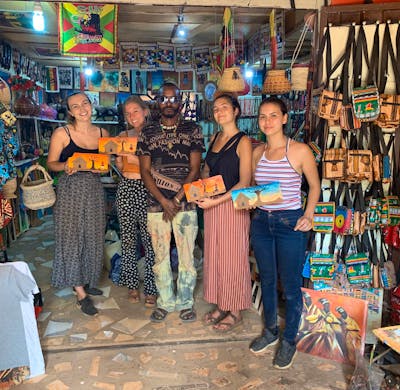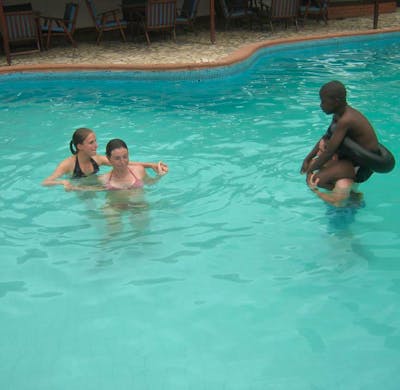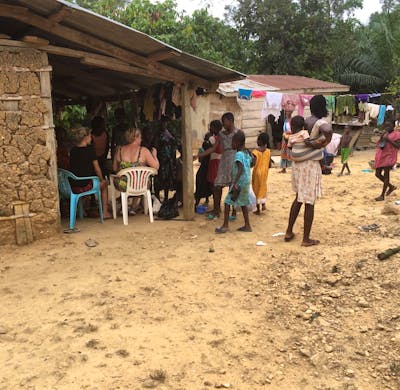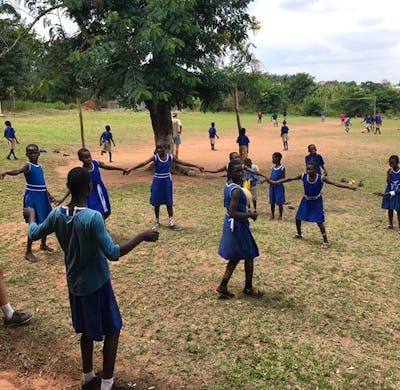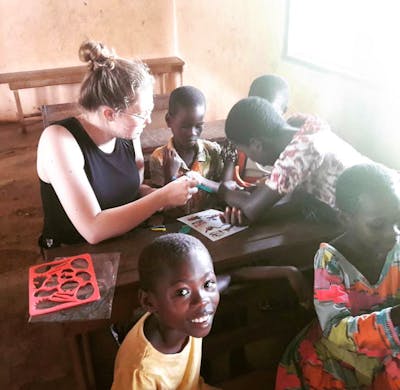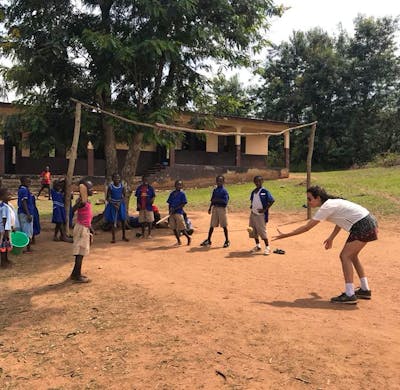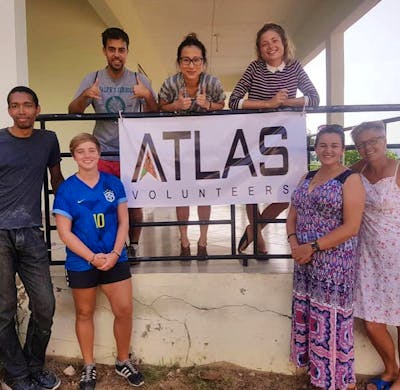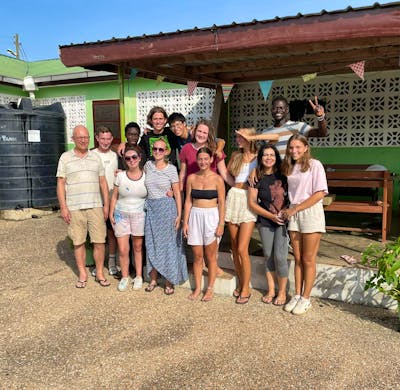About The Placement
We offer placements among all classes
of the Ghanaian education system, these are:
- Primary School
- Junior High School
- Secondary School
Most volunteers will take
placements in Primary and Junior High Schools which are based
together therefore adding an extra level of flexibility to meet
everyones needs. Secondary is usually reserved for qualified
individuals as once students have completed this level they are
university ready.
Within the schools the basic subjects are
taught regularly such as English, Maths, Science, Local Language,
Religious & Moral Education. Computing is taught with the best
will however usually this is from a text book as most schools don't
have access to a computer or laptop. Creative arts and music again
are absolutely adored by the children however due to lack of
materials these are mostly read and taught from textbooks.
Why This Placement?
Schools
in Ghana not only need your help to cope with the growing size of
classes, lack of a 'subsitute' teacher process but also to bring a
fresh approach to lessons which are traditionally very dictation
focused. Practicals are not experienced until secondary school and
throughout primary schools there is a distinct lack of supplies
especially for anything creative arts focused which is adored by the
children.
We aim to improve the standard of education in our area
by not only providing additional resources of staffing to seriously
understaffed and deprived communities, introduction of new and fresh
ideas to lessons and their planning but also supplying additional
learning materials and books otherwise unavailable.
You should not come expecting for the school to be at a stand still until a volunteer arrives, we are here to enhance and assist not to replace teaching staff. Education is an important factor of Ghanaian life where families circumstances allow them to pursue this so more often than not teachers will be present in their classrooms. Volunteers usually agree to a mix of teaching various classes with their teachers or headmaster. When you are not directly teaching or if this is not where you wish to help, you can be focusing as a teaching assistant/support role helping children that are struggling to keep up and on a one on one basis. The teaching style in our rural area is often dictation focused so it's easy for children that struggle with english to be left behind.
What Is Included In This Placement?
Support Staff - Accommodation - House Utility Bills - Pre Departure Support
We charge cost price for this project just so we can cover your
stay and employ local support staff to increase loyal employment. This
placement includes accommodation
in a modern style house for the semi rural area of which we are based
with great views and surroundings of the local towns and rainforest. All
house utilities are included for your time, you will have use of the
kitchen,
electricity throughout the house and running water which is a luxury
among the area of Kwahu. You will have a member of our local support
team living in house or close by depending on the volunteer numbers so
there is always someone on hand for any questions or support you may
need.
How Do I Get To The Placement?
Budget an additional 20 - 30 cedis per day for transport costs.
We
work with a number of schools within the local community and slightly
further out. Volunteers will usually take taxis back and forth to their
placement site. It is very easy to take shared taxis in town and
they are very reasonably priced. Most of our schools will require
volunteers to pay transport between 10 cedis and 40 cedis a day, with the
average
being about 18 cedis.
The more remote village schools are usually located
down tracks and therefore cost a little bit more to reach. Our team
will be able to assist volunteers group together for transport and where
to find taxis etc.
Volunteers are usually able to head off into the town after school
easily to shop for food supplies, grab a cold drink or meet up with
friends before heading home and the ease of taxis offer a really
flexible experience for the volunteers.
What Will I Be Doing?
Depending
on the school that you select after your introduction and what you
will feel comfortable with, you may be paired up with a teacher to
primarily start supporting as a teaching assistant or you may be
given a class yourself depending on your experience and confidence.
Although the thought of your own class may seem overwhelming at
first, the sheer enthusiasm and eagerness to learn of children will
be a strong push to spur you on the way. Where you feel that your teacher is a 'really good example' and you don't think you can bring anything to help, this is simply not the case. As we're sure you're aware even in developed countries there are teaching assistants and learning support departments to be able to offer an extra hand to those children that struggle especially in Ghana where it can be extremely difficuly for children to learn advanced topics in English which is their second language and a lot of them are not comfortable in using it constantly.
For the younger children
basic reading, writing and creative arts lessons are usually required
whereas for the older children we advise not only developing the
previous skills but breathing new ideas and life into their
textbooks. We have a wide range of teaching books and lesson plans
within the store room of the volunteer house and we advise volunteers
to make use of their free evening and weekend time to plan the
following days lessons.
A good example that we seen recently was
for a Primary 4 class, aged between 10 - 14 learning the topic of
solid, liquid and gas in science. Usually this topic will just be
dictated on the board and occasional notes made or exercises
completed. However a volunteer seen this upcoming topic in a textbook
and planned a cheap and effective practical lesson followed by a
poster produced by each child to take home and a board display to not
only brighten and improve the classroom but provide continuous
learning even for the next class to have use of the room.
Who Will I Be Working With?
If
the number permits we aim to group volunteers together at a
particular school or project. You will work closely with a teacher
and report to the Headteacher should you have any issues. A member of
our team will also spend a portion of their day at the project to
assist in anyway and offer any guidance should it be needed. Most
volunteers strike up a strong bond with the teachers and are treat as
another member of staff as if you were always there. It is not
uncommon to be invited round their homes for dinner at an early stage
as a way of saying thank you.
What Do We Expect From The Volunteers?
A
teaching qualification or experience is not compulsory for this
placement, your level of experience and confidence will gauge what
level of students would best suit and will be discussed between the
team and yourself on your first day introduction. The greatest traits
of a volunteer are enthusiasm, empathetic and the ability to adjust
to alternative cultures. You will get the most of our your trip by
opening your mind to new experiences and beliefs whilst also bringing
your own to the table.
We expect volunteers to visit their
placements Monday - Friday, exceptions can be made for long weekends
of travel etc but we hope for the children and yourselves to get the
most of your placement this is kept to a minimum.
What Can You Expect From Us?
We
will be on hand any time of any day to support you in your placement
and trip as a whole. There will always be someone you can speak to or
get a hold of should you want to discuss anything or require any
guidance, from organising after school clubs to changing your
placement. Our team living in the volunteer house will also be able
to offer advice regarding travel plans and the local area so you will
soon feel at home.
What Should I Bring?
Regarding
your placement we advise bringing plenty of school materials, arts &
crafts items and some ideas from teaching resource websites. These
will prove invaluable throughout your placement as there is a lack of
materials able to purchase in the local area. Basic pens, pencils and
cheap paper are available as well as moderate priced photocopying
should you wish to bring activity sheets.
What Happens During School Holidays?
During
school holidays if a volunteers assignments falls within these dates
then we will organise a holiday school at one of our partner schools.
During this time there is a more relaxed setup where volunteers split
into groups to run lessons such as arts, English, reading, sports and
games. This also has the added benefit of providing parents with
childcare during this period whilst they balance their work which is
usually farming or trading.
The school holidays usually fall three times a year; few weeks
around Easter, few weeks around August and a few weeks around Christmas.
Specific term dates are not communicated by local authorities until
closer to the time so difficult to tell in advance. Leading up to the
vacation, exams may be in place so volunteers can offer an assisting
role invigilating, helping out in free times or helping on our other
programs.
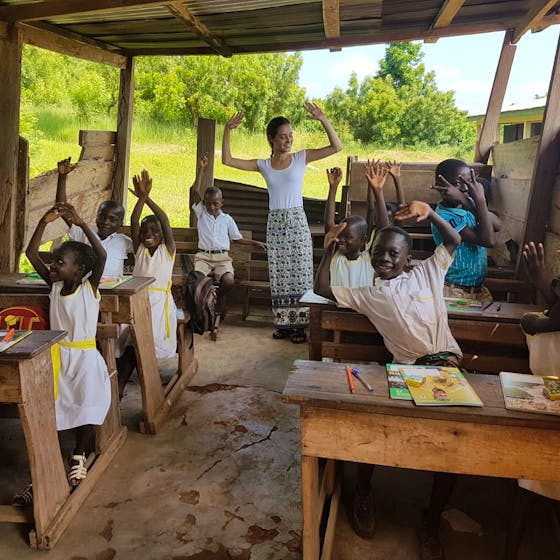
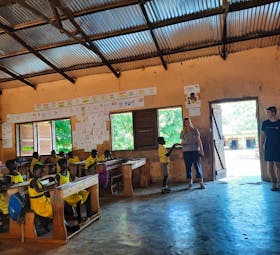
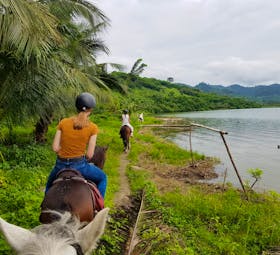
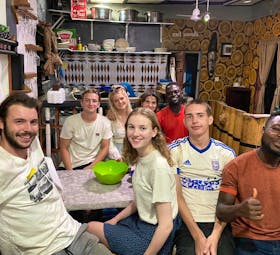
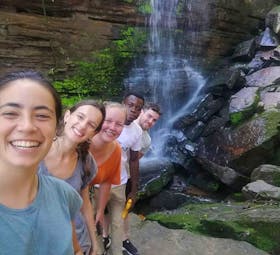
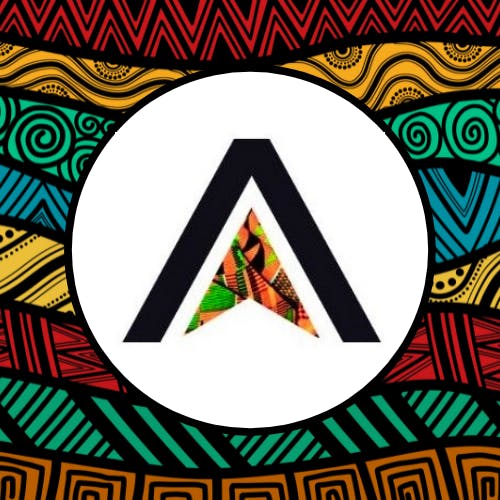

 4.8
4.8

